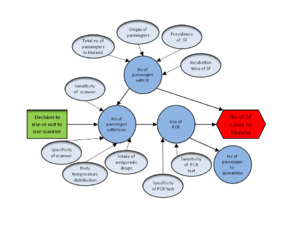Training assessment
| Moderator:Jouni (see all) |
| This page is a stub. You may improve it into a full page. |
| Upload data
|
This is a training assessment about an imaginary, simple case. The purpose is to illustrate assessment functionalities.
Scope
Question
Boundaries
- Time: Year 2010 - 2030
Scenarios
- Two scenarios for each climate policy (which have not been defined yet): policy is A) implemented, B) not implemented.
Intended users
- Anyone who wants to learn to make open assessments.
Participants
- Main participants:
- YMAL
- Summer workers of YMAL in 2012.
Answer
Results
Not yet available.
Conclusions
Rationale

⇤--#: . ovariable merge must update the slot marginal as well, otherwise it will not work. --Jouni 00:19, 2 May 2012 (EEST) (type: truth; paradigms: science: attack)
----#: . Function tidy should reshape data.frame so that Unit and Amount would make two columns instead of being in the long format. --Jouni 11:23, 1 May 2012 (EEST) (type: truth; paradigms: science: comment)
----#: . We need several pages for an assessment: the main page contains the variable list; /Probabilities contains the P(B) values; /Values contains the assessment-specific and decision-specific value judgements (whatever they are); /Decisionmakers contains the list of decisionmakers, decisions and outcomes. (Could /Values and /Decisionmakers be merged?) --Jouni 11:23, 1 May 2012 (EEST) (type: truth; paradigms: science: comment)
----#: . For each ovariable, we must include the code "formula" from the variable page. Formula includes both formula and dependencies for the variable. Then, these are used when using make.ovariable. The names should be like formula.Op_en2345 and dependencies.Op_en2345. --Jouni 11:04, 1 May 2012 (EEST) (type: truth; paradigms: science: comment)
⇤--#: . Slot "objects" is not needed, as variables are managed with their aliases as separate objects (ovariables). --Jouni 11:04, 1 May 2012 (EEST) (type: truth; paradigms: science: attack)
- ⇤--#: . If they are managed as separate objects, superassignment must be used. This is highly not recommended. A list of variables is a better idea. However, now the slot is called "vars". --Jouni 11:11, 2 May 2012 (EEST) (type: truth; paradigms: science: attack)
----#: . oassessment@decisionmakers$Value is needed but it is not quite clear how it should be used. It is some kind of scenario tool for Outcome, as different decisionmakers may have different values. Should it be an index in a value variable? --Jouni 08:55, 1 May 2012 (EEST) (type: truth; paradigms: science: comment)
----#: . Päätöksenteon sokea piste: se mitä ihmiset eivät näe mutta eivät myöskään huomaa etteivät näe. Kuitenkin tutkimalla sitä mitä mitä ihmiset eivät näe saadaan selville asioita sokeasta pisteesta. Ymmärtämällä sokeaa pistettä voidaan keksiä asioita jotka järjestelmällisesti jäävät huomaamatta ja asioita, joilla voidaan korjata järjestelmällisiä puutteita. Avoin arviointi on tämmöinen päätöksenteon järjestelmällisten puutteiden korjausmekanismi. --Jouni 08:55, 1 May 2012 (EEST) (type: truth; paradigms: science: comment)
Decision variables
- Climate policy 1
- Climate policy 2...
Indicators
- Cardiovascular mortality
- Pulmonar mortality
- Well-being...
Other variables
Assessment-specific data
| Obs | Name | Identifier | Direction | Alias |
|---|---|---|---|---|
| 1 | Climate change policies in Kuopio | Op_en5466 | wide | decision |
| 2 | Climate education in Kuopio | Op_en5582 | wide | education |
| 3 | Cost curves for energy | Op_en5478 | long | cost.curve |
| 4 | Energy transformations | Op_en5472 | wide | transformation |
| 5 | Energy balance in Kuopio | Op_en5469 | wide | energy.balance |
| 6 | Greenhouse gas emissions in Kuopio | Op_en5483 | long | GHG.emission |
Formula
----#: . This is a city-specific copy of the original code: Energy balance. --Jouni 06:52, 27 January 2012 (EET) (type: truth; paradigms: science: comment)
Value variables
Analyses
- Decision analysis on each policy: Which option minimises the health risks?
- Value-of-information analysis for each policy about the major variables in the model and the total VOI.
See also
References
Related files
<mfanonymousfilelist></mfanonymousfilelist>